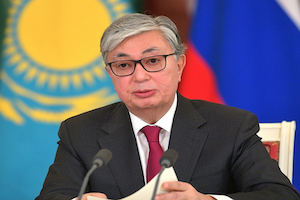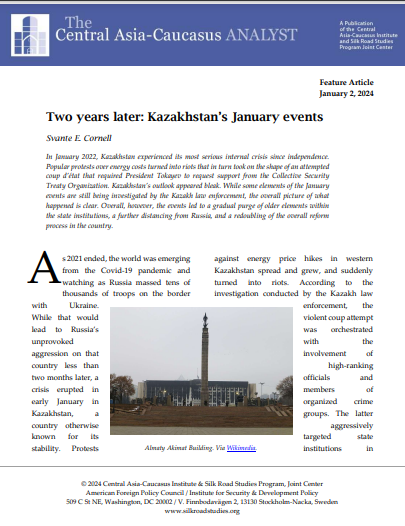Tokayev's Tightrope: Kazakhstan's Balancing Act in a Shifting World
By Anna Harvey
In a January 2025 interview with Ana Tili newspaper, Kazakhstan's President Kassym-Jomart Tokayev outlined his vision of Kazakhstan as a middle power balancing relations between global powers while pursuing domestic reforms. The analysis examines how Tokayev has moved to separate himself from his predecessor, Nursultan Nazarbayev, implementing constitutional changes, economic reforms, and foreign policy shifts following the January 2022 events, while facing the complex challenge of maintaining independence from both Russian and Chinese influence. Tokayev’s leadership marks a new stage of Kazakhstan’s development, positioning the country as an independent player on the global stage.
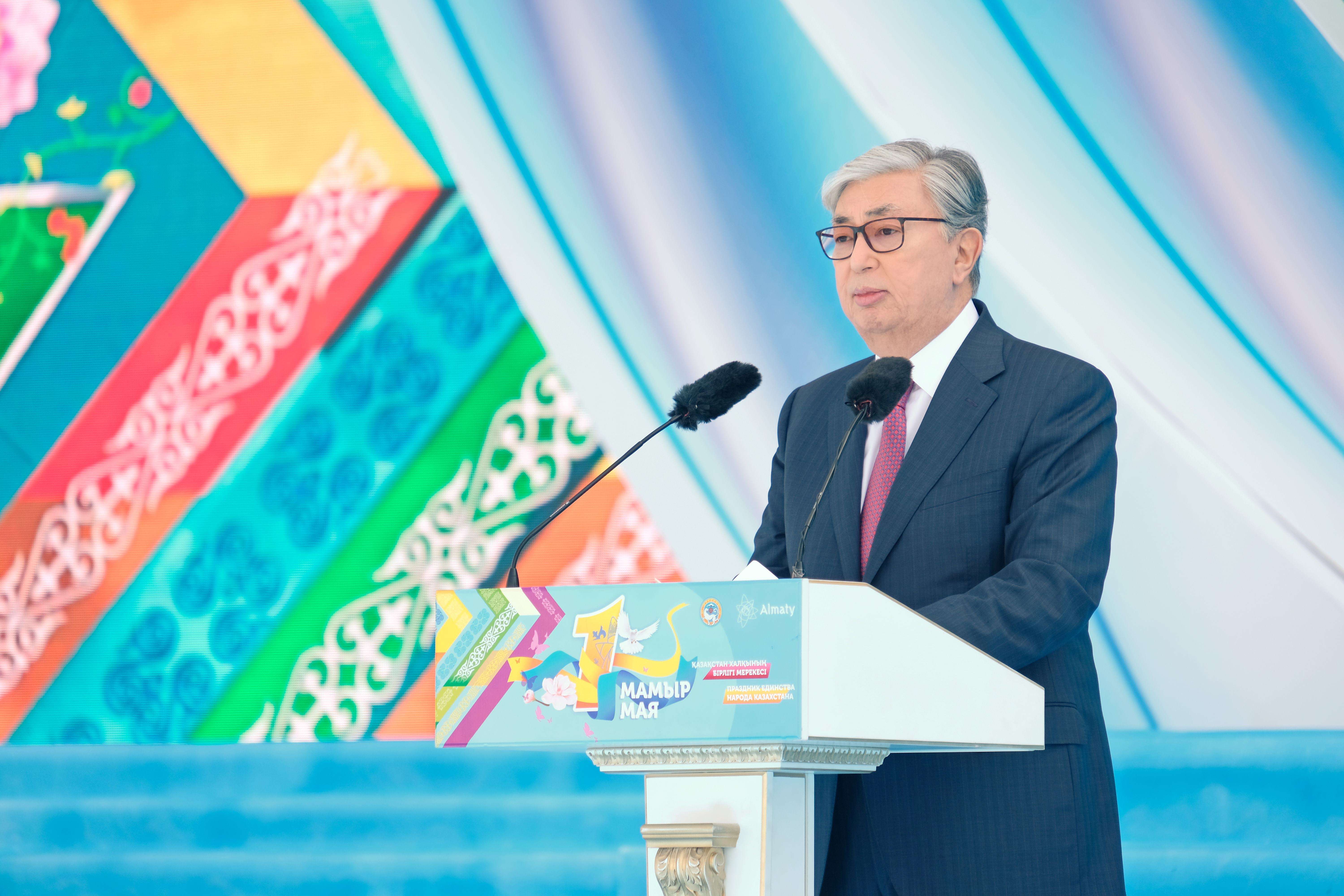
Photo by Vladimir Tretyakov
BACKGROUND: On January 3, 2025, the President of Kazakhstan Kassym-Jomart Tokayev gave a written interview with Ana Tili newspaper reflecting on 2024 and discussing Kazakhstan’s future. In the interview, Tokayev emphasized Kazakhstan's role as a "middle power" globally; its ties with the U.S., Russia, and China; Nazarbayev's legacy; economic development; and Kazakhstan's future goals. He also addressed the "January events," the January 2022 mass protests against gas prices that turned into an intra-elite fight and escalated into riots and violence.
In international politics, Tokayev expressed pride in Kazakhstan's "middle power" status, stating the country should "work collaboratively to build new, resilient bridges between conflicting geopolitical poles. Kazakhstan maintains support for the UN and other international organizations. Tokayev expressed optimism about relations with both the U.S. and China, noting Kazakhstan's willingness to support Washington regarding Ukraine and plans for extensive high-level dialogue with Beijing in 2025.
Regarding the former president, Tokayev characterized Nazarbayev's legacy as overwhelmingly positive and noted their strong relationship, including monthly phone calls. Despite his own efforts to reduce Russian influence in Kazakhstan, Tokayev expressed no concern about Nazarbayev's December meeting with Putin, describing such meetings as exchanges between "long-time friends and colleagues with much to reminisce about."
On the economic front, Tokayev praised Kazakhstan's progress while noting that "economic growth of 4 percent is insufficient." Rather than artificially holding exchange rates or micromanaging sectors, he stated his belief that the government should "ensure the stability and efficiency of the economy, the dynamic development of the real sector, growth in labor productivity, and the creation of high-quality jobs." He also supports recovering illegally obtained assets for reinvestment in education, infrastructure, and social needs.
Domestically, Tokayev highlighted extensive modernization projects in housing, roadways, railways, industry, and education. He also discussed the expansion of Kazakhstan’s social state: in 2024, the government began the National Fund for Children, where 50% of investment income from the National Fund of Kazakhstan will go to children's savings accounts for housing or education after age 18. Additionally, pensions, academic scholarships, and civil servant salaries were increased. Tokayev also emphasized his government's rapid response to spring 2024 flooding and efforts to build a "Clean Kazakhstan" through environmental initiatives.
In response to a question about the January events, Tokayev affirmed that, had decisive actions “not been taken against the instigators of the riots and organizers of the coup, Kazakhstan today would be a very different country, with diminished independence and restricted sovereignty.” The January events in question began on January 1, 2022, and began as protests against hikes in energy prices in western Kazakhstan. These protests appeared to be co-opted into an intra-elite struggle pitting parts of Nazarbayev’s entourage, specifically in the security structures, against Tokayev’s government, and spiraled into violent riots. Tokayev responded by requesting peacekeeping forces from the Collective Security Treaty Organization (CSTO) be deployed to suppress the rioters. In total, around 238 people were killed. Since the riots, Tokayev has used the memory of the events to support a number of governmental reforms, including strengthening the powers of parliament over the presidency. In his interview, the President encouraged citizens not to fall victim to disinformation related to the riots, and he later stated evidence of involvement from criminal groups in the January events was a driving force behind his efforts to strengthen law and order in Kazakhstan, a project labeled “Just Kazakhstan.”
IMPLICATIONS: Tokayev's interview reveals his continued efforts to establish an independent identity from his predecessor. Initially, Tokayev was depicted as largely a figurehead acting on behalf of Nazarbayev, in spite of clear indications that he was assertively pushing a reformist agenda against the resistance of elements of the “old guard.” Following the January 2022 events, he has made significant breaks from Nazarbayev's legacy through constitutional reforms, including stripping Nazarbayev's title of “Elbasy” (or national patriarch) and removing immunity protections for his family.
Further changes include increasing Kazakhstan’s presence on the world stage and decreasing reliance on Russia. Kazakhstan's “positive balance” policy (initially promoted by Tokayev in 1997, when he was Foreign Minister) has gained new significance, particularly following Russia's invasion of Ukraine. Tokayev’s condemnation of the invasion, acceptance of Russian draft evaders, and pursuit of alternative pipelines have established Kazakhstan as a middle power outside Russia's sphere of influence. Regionally, Kazakhstan has increased its influence through initiatives like the Turkic World Vision-2040 program.
Kazakhstan is Central Asia's largest economy ($261.4M GDP in 2023). Under Tokayev, the country is actively diversifying away from Russian and Chinese influence, especially as a result of Russia’s damaged reputation following the invasion of Ukraine and public skepticism toward Chinese business practices. Seeking alternatives, Kazakhstan has successfully attracted Western investment, particularly from the United States ($65B invested), which sees Kazakhstan as a potential alternate rare-earth supplier and strategic partner in the region.
CONCLUSIONS: President Tokayev has evolved beyond his initial role as Nazarbayev's chosen successor, building a distinct legacy as revealed in his Ana Tili interview. His vision for Kazakhstan's future emphasizes its role as a middle power, balancing engagement with the United States, European Union, Russia, and China to maintain political and economic sovereignty. Under his leadership, Kazakhstan has strengthened its position by expanding regional ties and diversifying its interests beyond Russia and China.
However, significant challenges remain. Kazakhstan must navigate complex domestic power dynamics, including potential resistance from remaining elements of the old guard and public discontent, especially regarding economic opportunities. Meanwhile, Russia continues to pressure Kazakhstan to limit its independent foreign policy, while public skepticism of Chinese influence constrains economic partnerships. The success of economic diversification and domestic reforms will depend on Tokayev's ability to manage these internal and external pressures while maintaining Kazakhstan's sovereignty.
AUTHOR’S BIO: Anna Harvey is a Researcher at the Central Asia and Caucasus Institute and the American Foreign Policy Council. She received a Master of Arts in Russian, East European, and Eurasian Studies from Stanford University. She has written for Newsweek, the U.S. Army War College War Room journal, and Postimees newspaper.
Two Years Later: Kazakhstan's January Events
By Svante E. Cornell
January 2, 2024
In January 2022, Kazakhstan experienced its most serious internal crisis since independence. Popular protests over energy costs turned into riots that in turn took on the shape of an attempted coup d’état that required President Tokayev to request support from the Collective Security Treaty Organization. Kazakhstan’s outlook appeared bleak. While some elements of the January events are still being investigated by the Kazakh law enforcement, the overall picture of what happened is clear. Overall, however, the events led to a gradual purge of older elements within the state institutions, a further distancing from Russia, and a redoubling of the overall reform process in the country.
Learning from Kazakhstan's January Crisis
By Svante E. Cornell
April 18, 2022
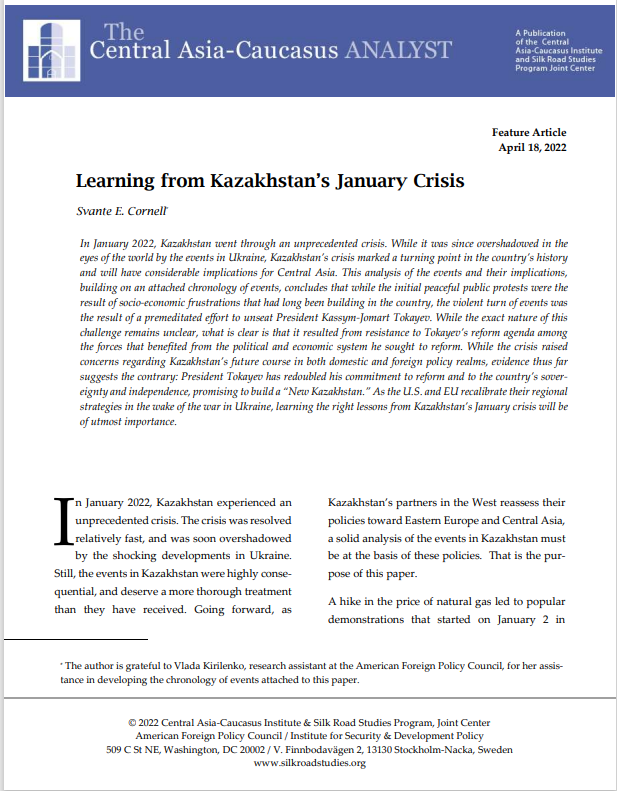 In January 2022, Kazakhstan went through an unprecedented crisis. While it was since overshadowed in the eyes of the world by the events in Ukraine, Kazakhstan’s crisis marked a turning point in the country’s history and will have considerable implications for Central Asia. This analysis of the events and their implications, building on an attached chronology of events, concludes that while the initial peaceful public protests were the result of socio-economic frustrations that had long been building in the country, the violent turn of events was the result of a premeditated effort to unseat President Kassym-Jomart Tokayev. While the exact nature of this challenge remains unclear, what is clear is that it resulted from resistance to Tokayev’s reform agenda among the forces that benefited from the political and economic system he sought to reform. While the crisis raised concerns regarding Kazakhstan’s future course in both domestic and foreign policy realms, evidence thus far suggests the contrary: President Tokayev has redoubled his commitment to reform and to the country’s sovereignty and independence, promising to build a “New Kazakhstan.” As the U.S. and EU recalibrate their regional strategies in the wake of the war in Ukraine, learning the right lessons from Kazakhstan’s January crisis will be of utmost importance.
In January 2022, Kazakhstan went through an unprecedented crisis. While it was since overshadowed in the eyes of the world by the events in Ukraine, Kazakhstan’s crisis marked a turning point in the country’s history and will have considerable implications for Central Asia. This analysis of the events and their implications, building on an attached chronology of events, concludes that while the initial peaceful public protests were the result of socio-economic frustrations that had long been building in the country, the violent turn of events was the result of a premeditated effort to unseat President Kassym-Jomart Tokayev. While the exact nature of this challenge remains unclear, what is clear is that it resulted from resistance to Tokayev’s reform agenda among the forces that benefited from the political and economic system he sought to reform. While the crisis raised concerns regarding Kazakhstan’s future course in both domestic and foreign policy realms, evidence thus far suggests the contrary: President Tokayev has redoubled his commitment to reform and to the country’s sovereignty and independence, promising to build a “New Kazakhstan.” As the U.S. and EU recalibrate their regional strategies in the wake of the war in Ukraine, learning the right lessons from Kazakhstan’s January crisis will be of utmost importance.
Elite fighting and the unrest in Kazakhstan
By Natalia Konarzewska
February 11, 2022, the CACI Analyst
On January 18, Kazakhstan’s former president Nursultan Nazarbayev gave a first video-recorded speech to the nation since the deadly unrest that shook the country in early January. In his address, Nazarbayev vehemently denied that there was any struggle for power in Kazakhstan’s top political echelons and called for supporting incumbent president Kassym-Jomart Tokayev. Yet there are many indicators that Nazarbayev, his family members and close associates are currently losing their posts in the state apparatus while president Tokayev concentrates his powers. The fast pace by which Nazarbayev’s legacy is dismantled by his successor in the aftermath of the recent deadly turmoil and CSTO intervention suggests that Kazakhstan’s carefully planned and micromanaged succession of power might have failed.
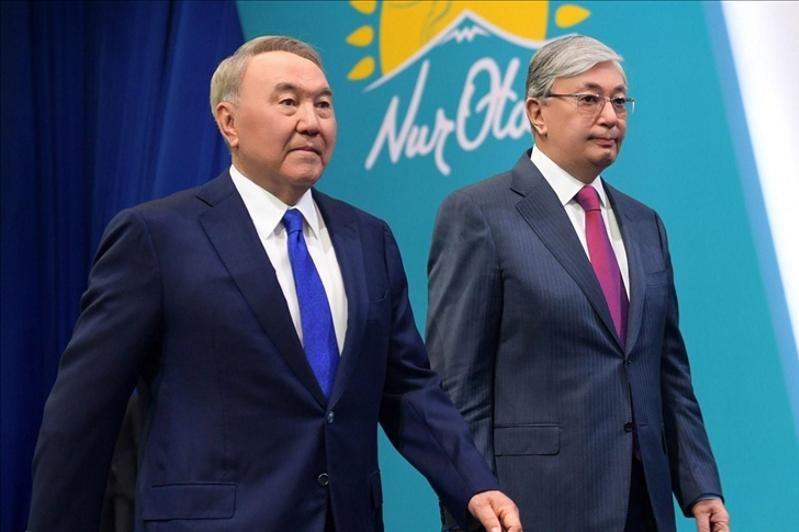
Kazakhstan Elects New President
By Natalia Konarzewska
June 18, 2019, the CACI Analyst
On June 9, 2019, Kazakhstan held snap presidential elections following the resignation of long-term President Nursultan Nazarbayev. Nazarbayev’s close associate and former speaker of the Senate Kassym-Jomart Tokayev won the ballot receiving 70.76 percent of the votes. The election was accompanied by large protests in the country’s capital Nur-Sultan and in Almaty, followed by detentions of hundreds of protesters. It is unlikely that the change of president will bring radical change in Kazakhstan. Tokayev has already declared his commitment to preserving Nazarbayev’s legacy. Multiple developments indicate that preparations for the power shift in Kazakhstan have been ongoing for years, suggesting that the presidential succession was carefully planned and micromanaged from behind the scenes to ensure a smooth transition of power.
